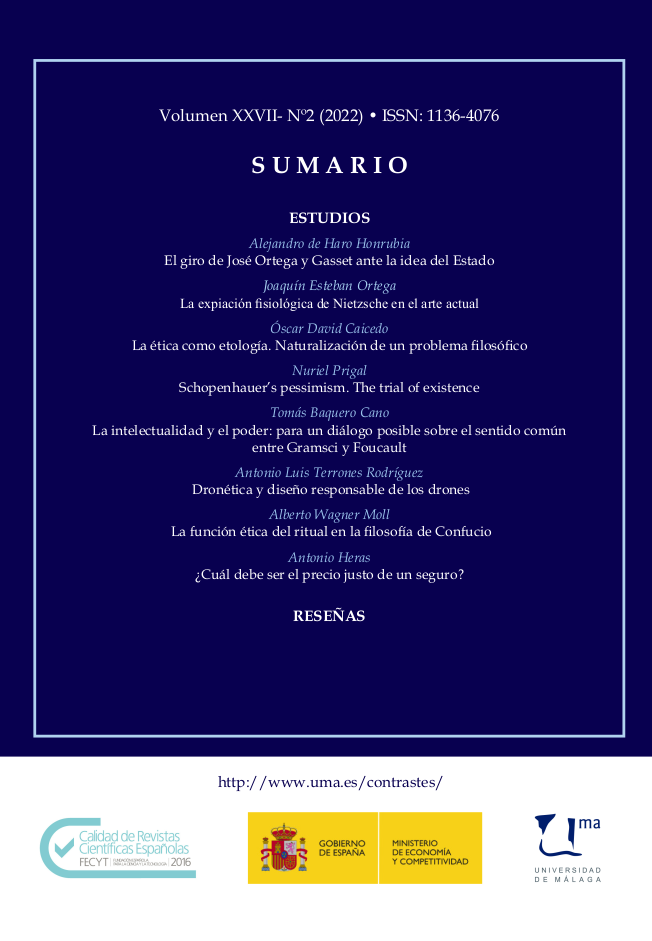El pesimismo de Schopenhauer: la prueba de la existencia
DOI:
https://doi.org/10.24310/Contrastescontrastes.v27i2.12510Palabras clave:
Metafísica, La voluntad, Sufrimiento, Justificación, Filosofía de vidaResumen
Intento presentar una descripción más holística y detallada de las premisas filosóficas pesimistas de Schopenhauer y sus implicaciones. La discusión comienza con la afirmación de Schopenhauer de que el mundo es representación y con el descubrimiento de la voluntad. Continúa examinando las implicaciones de la voluntad, las cuales conducen al argumento contra la existencia misma.
Descargas
Métricas
Publicación Facts
Perfil de revisores N/D
Información adicional autores
Indexado: {$indexList}
-
Indexado en
- Sociedad Académica/Grupo
- N/D
- Editora:
- Universidad de Málaga
Citas
ATWELL. J. E. (1990), Schopenhauer: The Human Character, Philadelphia: Temple University Press.
ATWELL, J. E. (1995), Schopenhauer on the character of the world: The Metaphysics of Will, University of California Press.
BERGSON H. (2001), Time and Free will, an Essay in The Immediate of Consciousness, Translated by F. L. Pogson. United States: Dover Publications, Inc.
BERKELEY G. (1996), Principles of Human Knowledge and three dialogues, New York: Oxford University Press.
BERGER. D.L. (2004), «The Veil of Maya»: Schopenhauer’s system and early Indian thought, New York: Global Academic Publishing, Binghamton.
GARDINER. P. (1997), Schopenhauer, Dulls, Virginia: Thoemmes Press.
HAMLYN, D. W. (1980), Schopenhauer, London: Routledge & Kegan Paul.
HUME D. (2007), Dialogues Concerning Natural Religion: And Other Writings, New York, Cambridge University Press.
JACQUETTE. D. (2005), The Philosophy of Schopenhauer, Ithaca: McGill-Queen’s University Press, Montreal & Kingston.
JANAWAY. C. (1994), Schopenhauer: A very short introduction, Ney York: Oxford University Press.
JANAWAY. C. (1989), Self and World in Schopenhauer’s Philosophy, New York:Clarendon Press Oxford.
JORDAN. N. (2009’) Schopenhauer’s Ethics of Patience: virtue, salvation, and value, New York: The Edwin Mellen Press.
LAUXTERMANN P. (2000) Schopenhauer’s Broken World-View: Colours and Ethics between Kant and Goethe, Dordrecht: Springer-Science+Business Media Dordrecht.
MAGEE B. (1983), The Philosophy of Schopenhauer, New York: Oxford University Press.
NEELEY, S.G. (2004), Schopenhauer: A Consistent Reading, Lewiston, N.Y.: Edwin Mellen Press.
SCHOPENHAUER A. (2019), Die Welt als Wille und Vorstellung: Gesamtausgabe (German Edition), epubli; first edition.
SCHOPENHAUER A. (1974), On the Fourfold Root of the Principle of Sufficient Reason, Translated by E. F. J. Payne. USA: Open Court Publishing.
SCHOPENHAUER A. (1974), Parerga and Paralipomena, Volume 2, Translated by E. F. J. Payne. New York: Oxford University Press.
SCHOPENHAUER A. (1966), The World as Will and Representation, Volume 1, Translated by E. F. J. Payne. New York: Dover Publication Inc.
SCHOPENHAUER A. (1966), The World as Will and Representation, Volume 2, Translated by E. F. J. Payne. New York: Dover Publication Inc.
SCHOPENHAUER A. (2010), The Two Fundamental Problems of Ethics, Translated by D. E. Cartwright & E. E. Erdmann. New York: Oxford University Press.
WICKS, R. (2008), Schopenhauer, Oxford: Blackwell.
WICKS R. (2011), Schopenhauer’s The World as Will and Representation: A Reader’s Guide, London: Continuum.
YOUNG. J. (2005), Schopenhauer, Severin Schroeder, New York: Routledge.
VANDENABEELE B. (2011), «Schopenhauer on Sense Perception and Aesthetic Cognition», The Journal of Aesthetic Education, Vol. 45, No. 1, pp. 37-57.
WITTGENSTEIN L. (2002), Tractatus Logico-Philosophicus, translated by D. F. Pears & B. F. McGuiness. London: Routledge, Taylor & Francis e-Library.
Descargas
Publicado
Cómo citar
Número
Sección
Licencia
Esta revista provee acceso libre inmediato a su contenido bajo el principio de hacer disponible gratuitamente la investigación al público. Todos los contenidos publicados en Contrastes. Revista internacional de Filosofía, están sujetos a la licencia Creative Commons Reconocimento-NoComercia-Compartirigual 4.0 cuyo texto completo puede consultar en <http://creativecommons.org/licenses/by-nc-sa/4.0>
Es responsabilidad de los autores/as obtener los permisos necesarios de las imágenes que están sujetas a derechos de autor.
Los autores/as cuyas contribuciones sean aceptadas para su publicación en esta revista conservarán el derecho no exclusivo de utilizar sus
contribuciones con fines académicos, de investigación y educativos,
incluyendo el auto-archivo o depósito en repositorios de acceso abierto de cualquier tipo.
La edición electrónica de esta revista esta editada por la Editorial de la
Universidad de Málaga (UmaEditorial), siendo necesario citar la procedencia en cualquier reproducción parcial o total.










5.png)
